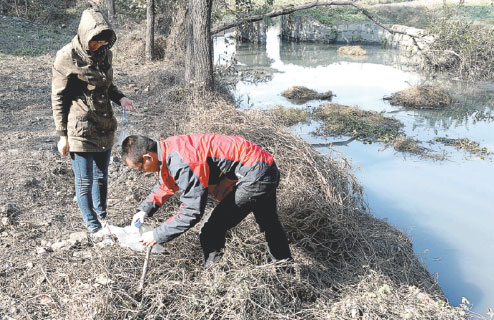People-power plan to make China's lakes superior
 0 Comment(s)
0 Comment(s) Print
Print E-mail China Daily, May 12, 2015
E-mail China Daily, May 12, 2015
 |
|
Volunteers for an environmental NGO collect water samples for testing near a factory in Huainan, Anhui Province, in November. [Photo/Xinhua] |
Wider funding channels
In addition to greater public participation, private enterprises are also being encouraged to play a role in the antipollution efforts, according to experts.
In March, Jiao Yong, vice-minister of water resources, said social capital accounts for less than 20 percent of the total investment in water conservancy projects. Guidelines issued by the Ministry of Finance and Ministry of Environmental Protection in May ordered local authorities to encourage the growth of public-private partnerships.
The ministries listed 18 areas, including the protection of water sources, treatment of wastewater and the restoration of the groundwater environment, as fields in which the partnerships should be encouraged to operate.
Wang Annan, deputy head of the Chinese Academy for Environmental Planning, said one of the biggest challenges centers on reducing the number of polluted bodies of water in urban areas.
Moreover, Wu said it will be difficult to meet the central government's target of lowering the volume of "black and smelly water" in urban areas to 10 percent by 2020: "Many cities are discharging large amounts of wastewater, and they are also suffering from low water levels in many rivers. Even small amounts of pollutants can cause big problems when water levels are low."
Zhao Yumin, head of the Water Supply and Drainage Office at the Xi'an Municipal Bureau of Water Resources in Shaanxi province, said more wastewater treatment plants are needed to deal with the large number of polluted lakes and other bodies of water in urban areas. "Without these plants, only untreated waste will be discharged into the rivers," he said.
However, he admitted that few local governments can afford to fund construction of the plants. "That could open the channels for social capital because it's impossible for the authorities to provide all the funding," he said.
The authorities in Xi'an have already taken tentative steps to introduce private capital into wastewater treatment projects by partnering with Chengdu Xingrong Investment Co to build a plant that will process 200,000 tons of wastewater every day.
"We charge 1 yuan (16 cents) to process each metric ton of water," said Zhang Haoxing, manager of the plant, who declined to discuss the company's profit margin.
Sun Qi, an official with the Shaanxi provincial Department of Water Resources, said that social capital accounts for just a small part of the total investment in the province's efforts to treat polluted rivers.
"Few private businesses are interested in wastewater projects because the profit margins are low," he said.
Ma, the NGO director, said official supervision will be key to ensuring that public-private partnerships operate smoothly, and that a transparent bidding process for projects is essential to ensure that the businesses with the best technology are awarded the contracts. He added that close supervision would be required to ensure that the companies comply with the environmental laws.
"We must never forget that the nature of private capital is to pursue profit. Without adequate supervision, privately operated treatment plants could themselves become sources of pollution as they try to reduce costs," he said.






Go to Forum >>0 Comment(s)